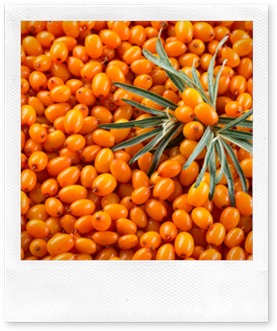Vulvovaginal thinning, known as atrophic vaginitis, or more recently, genitourinary syndrome of menopause, is the thinning and drying of vulvovaginal mucosa associated with lower estrogen levels, often seen in perimenopause and menopause. Symptoms include vulvovaginal discomfort, dryness, burning, itching, and dyspareunia. Intravaginal and/or topical vulvar estrogen is the conventional treatment of choice. Sea buckthorn (Hippophae rhamnoides, Elaeagnaceae) oil has been used in studies for dry eye syndrome, a frequent symptom also associated with menopause. Historically, sea buckthorn oil has been used in Central Asian medicine to treat inflammations of the genital organs and uterus.
 A randomized, double-blind, placebo-controlled study was conducted to investigate the effects of oral sea buckthorn (SB) oil on vaginal atrophy among postmenopausal women. The study was conducted at a private clinic in Finland. One hundred sixteen postmenopausal women aged 55 to 75 years, reporting moderate or severe dryness/burning/itching of vaginal mucous membranes, were enrolled. In the sea buckthorn group, 46 of 57 completed the study. In the placebo group, 52 of 59 completed the study. Study visits were baseline and after 3 months.
A randomized, double-blind, placebo-controlled study was conducted to investigate the effects of oral sea buckthorn (SB) oil on vaginal atrophy among postmenopausal women. The study was conducted at a private clinic in Finland. One hundred sixteen postmenopausal women aged 55 to 75 years, reporting moderate or severe dryness/burning/itching of vaginal mucous membranes, were enrolled. In the sea buckthorn group, 46 of 57 completed the study. In the placebo group, 52 of 59 completed the study. Study visits were baseline and after 3 months.
The important measures of atrophy include vaginal pH, moisture, vaginal elasticity, vaginal maturation index, epithelial integrity/moisture/fluid volume and symptoms of vaginal atrophy. In this study, vasomotor symptoms, psychological symptoms associated with menopause, skin health and the health of other mucous membranes were also evaluated, as well as serum markers associated with cardiovascular disease and metabolic syndrome.
Women were given 3 g of sea buckthorn oil or placebo oil in doses of 3 capsules twice daily for 3 months. Vaginal elasticity, epithelial integrity, moisture, and fluid volume were scored from 1 to 5, and were evaluated at baseline and 3 months. The pH of the vaginal wall was measured and scored from 1 to 5. A higher value on the vaginal health index (VagHI), calculated as the sum of scores for elasticity, epithelial integrity, moisture, fluid volume, and pH, indicates less atrophy. The vaginal maturation index (MI) was evaluated from Pap smears but was only taken from a random sample of 15 patients using SB oil and 15 patients using placebo.
Women evaluated the severity of vaginal dryness, burning, and itching on a scale from 0 (none) to 3 (severe) at baseline, 6 weeks, and at the end of the intervention. They also recorded daily symptoms, measuring each symptom on a scale from 0 (none) to 3 (severe).
Results: Sea buckthorn oil consumption led to an increasing trend on the Vaginal health index; a decreasing trend was seen in the placebo group. Women in the sea buckthorn group also had a significantly better rate of improvement for vaginal epithelial integrity compared with placebo. A nonsignificant trend for enhanced epithelial integrity was observed in the sea buckthorn group. The average changes in the scores for vaginal epithelial integrity from baseline to the end of the 3 months were significantly better in the sea buckthorn group compared with placebo. The effect on epithelial integrity change was also in favor of the sea buckthorn oil. There were also less night sweats in the sea buckthorn group compared to the placebo group.
On the other hand, sea buckthorn oil did not significantly affect vaginal pH, vaginal maturation index, vaginal elasticity, fluid volume, moisture, or the symptoms of vaginal dryness, burning, or itching. Vaginal pH was not affected by the SB oil, indicating a lack of estrogenic effect. No significant differences were observed in cholesterol, triglycerides, C-reactive protein, or liver enzymes during the study
Commentary: The observed positive effects on vaginal epithelium was likely due to select compounds in sea buckthorn oil, rather than an estrogenic effect. Even though vaginal epithelial integrity and was improved in the sea buckthorn group, the fact that there was no improvement in vaginal pH, elasticity, fluid volume, moisture or the vulvovaginal atrophic symptoms of dryness, burning and itching, I think this treatment is not a good alternative to the safe local use of vulvovaginal estrogen products.
.
Reference: Larmo PS, Yang B, Hyssälä J, Kallio HP, Erkkola R. Effects of sea buckthorn oil intake on vaginal atrophy in postmenopausal women: a randomized, double-blind, placebo-controlled study. Maturitas. 2014;79(3):316-321.

